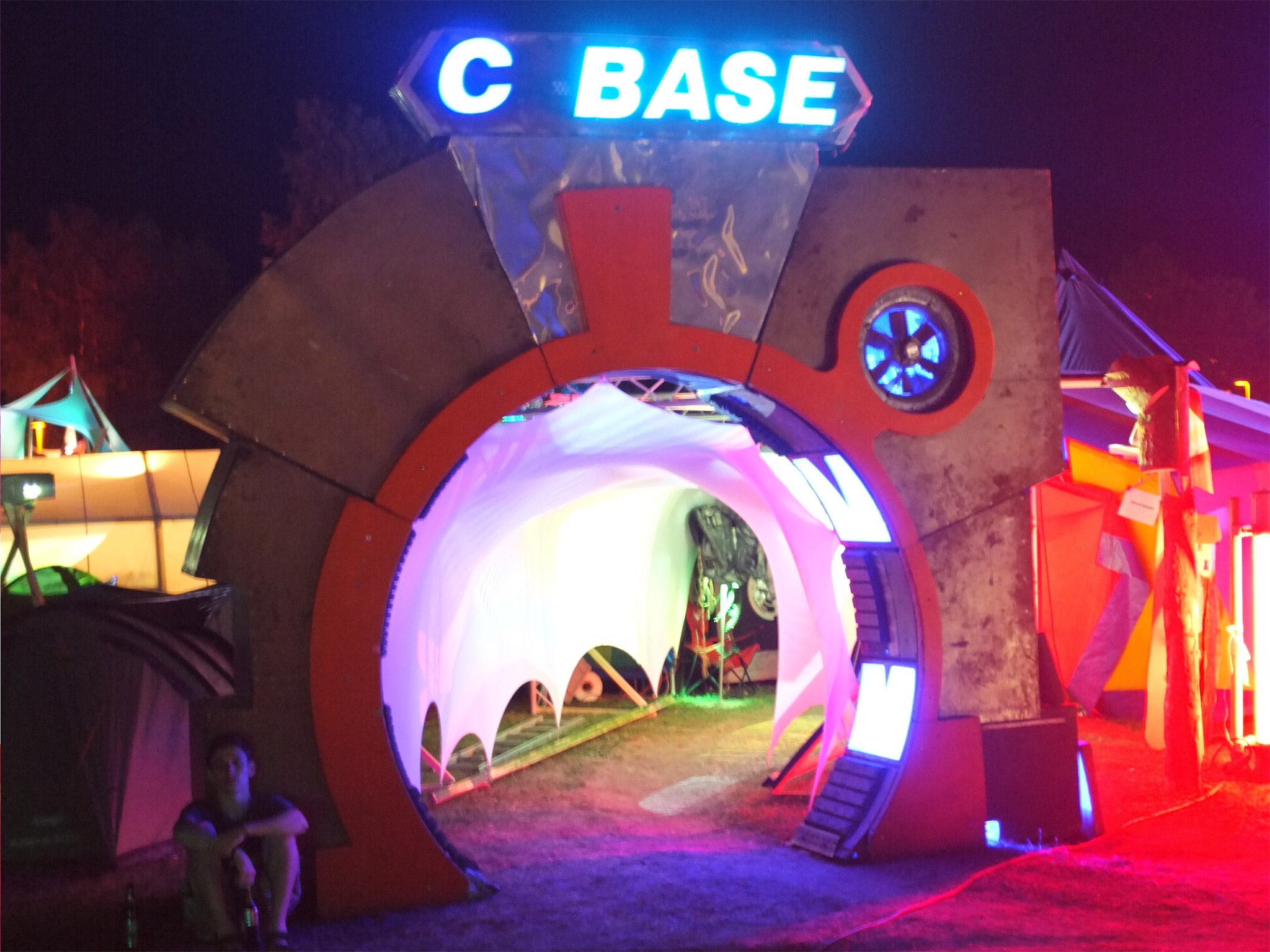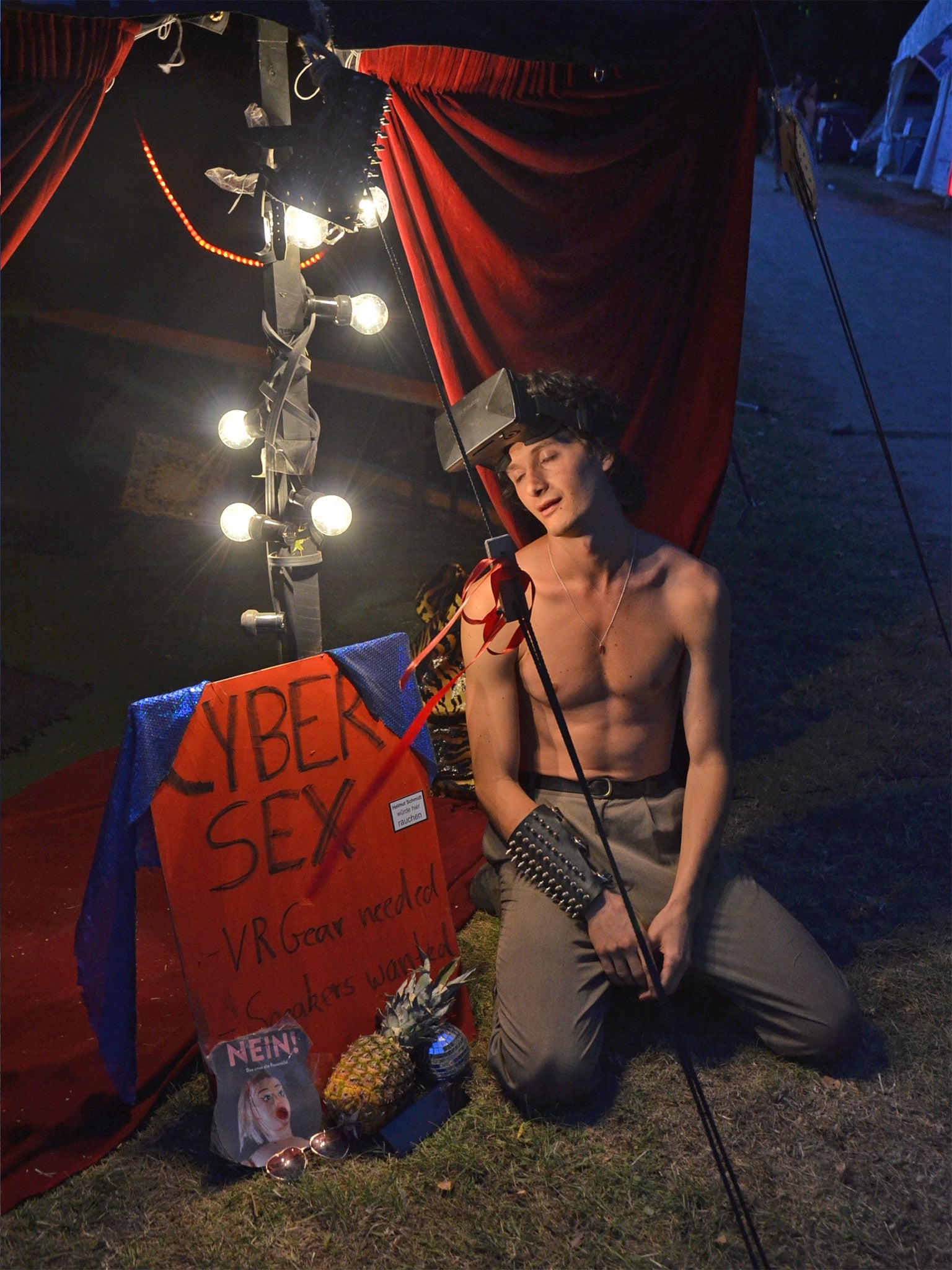Chaos Communication Camp: Cyber pirates gather in Berlin for smart drugs, virtual sex, and the fight against global mass surveillance
At the Chaos Communication festival, the idea that online activists are loners is blown apart in a frenzy of cyber sex, smart drugs and ear-splitting music. But, says Charlie Gilmour, there is also a serious political point to the party

Quite how I ended up in a marquee an hour north of Berlin being sketched, stark b*****k naked, by some of the world's leading digital activists and hackers is not entirely clear. There was a party at a London embassy, a drunken promise to help with an art project at "hacker Glastonbury", and now, somehow, here I am, providing a little light entertainment before the campers get back to the important business of fighting the National Security Agency and teaching robots to mix cocktails.
At the Chaos Communication Camp – the international hacking festival held in Germany every four years – almost anything can and indeed does happen. Organised by the Chaos Computer Club, the influential German hacker association founded in 1981, it has everything you might expect from a "normal" festival. Fantastical decorations, solicitous drug dealers and ear-splitting music abound. It's the inter-tent Ethernet cables, low-flying drones, and workshops that cover everything from reverse-engineering sex toys, to hacking cars, to learning how to turn your own skull into a sound system that, by comparison, place all other parties somewhere in the Dark Ages.
Preparing for CCC was a nerve-racking affair. "Assume that there will be many people at the camp who try to exploit security holes," the organisers warn. And most importantly: "Don't trust anyone." For troglodytes such as me – whose idea of encryption is hiding one's laptop under the bed – they advise simply leaving all devices switched off. Even the Kenyan systems analyst I meet on the bus is nervous. "I am going to be wary of connecting to the internet at camp," he says. "GSM (the phone network) is not safe either. It's all easy to hack."
When I arrive at Ziegeleipark, the disused brick factory and open-air museum that hosts CCC, it turns out that I am the one who has to carry out a little improvised hacking. My ticket, acquired through somewhat clandestine channels, is a dud. Thankfully, for a community as paranoid as the international digital elite, security is surprisingly lax and, with the help of a friend, I manage to hack the site.
"System overload" is, perhaps, the only way to describe the camp's aesthetic. It is as if the internet has snaked its way out of the cables and given birth to a monster. "Lolcats" from times gone by are projected on to the sides of tents. A 3D printer, larger than any I've seen, conjures an intricate black Buddha magically from the air. "Mods are asleep post ponies!" a pale, skinny hacker shouts excitedly to no one in particular, a reference to an obscure online in-joke. Everywhere, geeks of all shapes and sizes hunch over computers, playing with code, smoking dope and taking great slugs of Club-Mate, the hackers' caffeinated tipple of choice.
Hackers, believe it or not, know how to party. On the first night I find myself drawn to a red- velvet yurt. A pair of virtual reality goggles dangle tantalisingly above the entrance; a hand-painted sign promises cyber sex within.
The sign, it turns out, is nothing but analogue clickbait – there to draw people in – and highly effective it is too. Hackers, mostly male, pile into the yurt and look around expectantly, waiting for the sex to begin. The situation is a microcosm of the festival itself. People lured on the promise of something virtual and intangible are forced into real, human, face-to-face interaction. Discussions about the future of teledildonics (computer-controlled sex toys), and the possibility that in 10 years' time we will all be having sex with robots, ensue.
Others, however, decide they are going to get their kicks the old-fashioned way. When the LSD-coated sugar cubes come out boundaries begin to dissolve entirely. Hackers strip and writhe around on the floor. A drug dealer – once, it is claimed, a big player on the online drugs marketplace Silk Road – sprinkles crystals of MDMA from on high. The scene is a million miles from the old cliché of hackers being friendless and basement-dwelling.
"Hackers are hyper-social," explains anthropologist Gabriella Coleman, author of several books on the subject, when I meet her in the tea tent the next day. "First of all, they congregate in cities. Then they tend to hang out online and interact during the day on chat channels and stuff like that. And then they actually hang out on top of it. People still see hackers as asocial people who work by themselves. But they're intensely social and collective."
CCC is far more than just a mad hackers' tea party, however. "We are a few thousand people with very powerful knowledge and skills," says the spokesperson delivering the camp's opening address. "Let's use them for something excellent. I hope that the camp will be a great source of inspiration and that you will be able to connect, learn and share ideas and strategies. There are still a lot of broken systems to fix."

A system that is broken, in the minds of many here, is one that is un-free. Projects being discussed range from the use of drones to fly abortion pills into countries where birth control is illegal, to anonymous web browsers that allow users to surf the net free from government surveillance, to cryptographic tools that enable whistle-blowers and journalists to work together in relative safety.
Claudio Guarnieri, a digital-security specialist known online as "Nex", is one of the many individuals who have come here to recruit hackers into the fight against global mass surveillance. "People see technical or security issues as detached from society and humanity," says Guarnieri, who uses his anti-surveillance skills to protect journalists and activists in countries with poor human-rights records. "But it's not. I've seen situations where people were targeted and they just disappeared. They managed to get into their deepest personal lives – through their computers. If you are able to get that depth of information on an individual, you can destroy their lives. In some cases that means physically. I think there are people who have good politics and good consciousness who will be willing to volunteer some time [to fight against this]."
The war for digital freedom has claimed many casualties, and at CCC they are not forgotten. "Free Chelsea Manning: Heroic Wikileaks Whistleblower" posters adorn the sides of tents, and elsewhere activists run stalls encouraging campers to write to political prisoners such as Jeremy Hammond, currently serving 10 years for hacking and leaking the emails of global intelligence company Stratfor.
Despite it all, Sarah Harrison, the Wikileaks editor who accompanied Edward Snowden on his famous flight from Hong Kong to Moscow, points out a tiny ray of light at the end of the tunnel. "Something I have found hopeful to see at CCC," she tells me, "are the number of children who are inquisitive, knowledgeable and have an understanding and passion about concepts such as privacy and encryption. I hope that we allow them a world where they can still have these things."
Join our commenting forum
Join thought-provoking conversations, follow other Independent readers and see their replies
Comments
Bookmark popover
Removed from bookmarks